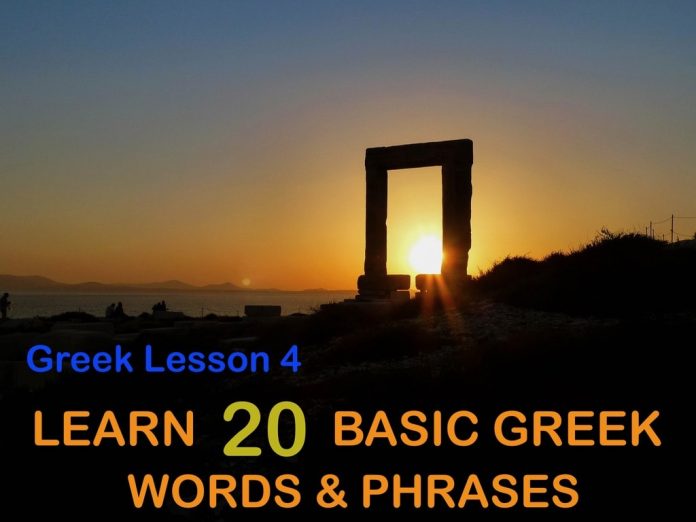Greek lesson 4 teaches you a few basic Greek words and phrases to slowly build up Greek language skills and confidence in speaking Greek.
These are common Greek words, everyday Greek words, and useful Greek words that every traveler who finds themselves in Greece should know.
Who doesn’t want to know how to buy a Greek coffee in Greece?
This lesson will teach you this and many other useful Greek words and phrases.
20 Basic Greek Words and Phrases
Your time in Greece will be way better if you learn all of these basic Greek words, especially when you know how to say polite Greek words like thanks.
Do your best to remember all of these Greek words and Greek phrases because there’s an excellent chance you’ll have an opportunity to use a few of them at some point in Greece.
Note: Greek lesson number 4 won’t cover popular greetings in Greek, ways to say goodbye in Greek, or asking how are you in Greek, since they’ve been taught in Greek lessons 1-3.
So if you want to learn some Greek greetings, go to that lesson.
Greek Speaking Learning Method
Greek lesson 4 uses the same teaching method as the other Greek-speaking lessons.
It would be best if you spoke the words shown in blue and red text since this is the principal Greek lesson to learn.
Just say the words as you see them, and you’ll be speaking Greek in no time. Say the words out loud ten times as shown, because then everything will be much easier to remember.
You will learn basic Greek words and phrases very quickly using this easy-to-follow method.
If you want to understand better how this simple Greek language lesson works, you can always read the more detailed introduction in Greek lesson 1 – Greetings.
Now let’s begin.
Thanks / Thank you
Ef-hari-stor
Ef-hari-stor
Ef-hari-stor
Ef-hari-stor
Ef-hari-stor
Ef-har-ree-stor
Ef-har-ree-stor
Ef-har-ree-stor
Ef-har-ree-stor
Ef-har-ree-stor
This is the most common way to say thanks in Greek.
You may also hear S’Efharisto and Sas Efharisto.
The difference between S’Efharisto and Sas Efharisto has once again to do with being polite (for example, to your manager or the elderly).
So, S’Efharisto is actually “Se Efharisto” which means “I thank you.”
On the other hand, Sas Efharisto is this odd plural form that you use either when you thank more than one person (like an audience, a couple) or a senior citizen.
In any case, using Efharisto is fine for every occasion.
Thank you, very much
Ef-hari-stor, Por-lee
Ef-hari-stor, Por-lee
Ef-hari-stor, Por-lee
Ef-hari-stor, Por-lee
Ef-hari-stor, Por-lee
Ef-har-ree-stor, Poly
Ef-har-ree-stor, Poly
Ef-har-ree-stor, Poly
Ef-har-ree-stor, Poly
Ef-har-ree-stor, Poly
Poly means a lot.
After saying Efharisto, you add Poly, when you’re grateful, or you want to be polite.
You say Efharisto Poly in the same situations as you do when you say thank you very much in English.
Please / You’re welcome
Para-kalo
Para-kalo
Para-kalo
Para-kalo
Para-kalo
Parakalo
Parakalo
Parakalo
Parakalo
Parakalo
Parakalo has two different meanings. It is used for saying please and you’re welcome.
Yes
Neh
Neh
Neh
Neh
Neh
Ne
Ne
Ne
Ne
Ne
Think of Neh as Yeah in English because it can get confusing. This is because the Greek “Yes” sounds quite similar to the English “No.”
Yes, please
Neh, pa-ra-kalo
Neh, pa-ra-kalo
Neh, pa-ra-kalo
Neh, pa-ra-kalo
Neh, pa-ra-kalo
Ne, parakalo
Ne, parakalo
Ne, parakalo
Ne, parakalo
Ne, parakalo
No
Or-hee
Or-hee
Or-hee
Or-hee
Or-hee
Ohi
Ohi
Ohi
Ohi
Ohi
No, thanks
Or-hee, ef-hari-stor
Or-hee, ef-hari-stor
Or-hee, ef-hari-stor
Or-hee, ef-hari-stor
Or-hee, ef-hari-stor
Ohi, ef-har-ree-stor
Ohi, ef-har-ree-stor
Ohi, ef-har-ree-stor
Ohi, ef-har-ree-stor
Ohi, ef-har-ree-stor
OK
End-dark-si
End-dark-si
End-dark-si
End-dark-si
End-dark-si
En-da-kse
En-da-kse
En-da-kse
En-da-kse
En-da-kse
Fantastic
Fantastico
Fantastico
Fantastico
Fantastico
Fantastico
Fantastic-or
Fantastic-or
Fantastic-or
Fantastic-or
Fantastic-or
Fantastico is a way of saying “Great” in Greek.
If someone asks, “was the football match any good?” and you wanna say “Great,” you could go with:
- “Fantastico” (Fantastic)
- “Tromero” (Amazing)
Fantastico is simple to remember. it almost sounds Italian. So this is one very basic Greek word you can easily use in a variety of scenarios. How was the beach? Fantastico
If someone asks, “Do you like this?” and you want to say, “Great,” you could also reply:
- “Teleia” (Perfect)
Nice
Or-ray-a
Or-ray-a
Or-ray-a
Or-ray-a
Or-ray-a
Oraia
Oraia
Oraia
Oraia
Oraia
Oraia – Nice (can also mean fine, good, beautiful)
If someone asks you, “Did you have a good time?” an answer is “Oraia.” It’s exactly like “nice” in English.
How Masculine, Feminine and Neutral are used in Greek Grammar
You won’t understand it in this lesson, but this will give you an idea of what awaits. It will confuse you, but it will give you an idea of some of the complexities when speaking the Greek language.
If someone asks, “How is your coffee?” Coffee in Greek is masculine, so it’s “o Kafes.” Therefore the reply will be “Oraios.”
If you see a beautiful woman (i Yineka (woman), feminine), then you’ll say “Oraia.”
The three genders are O (Masculine), I (written H, feminine), To (neutral).
I Yineka will be like Ee Yeeneka. (Greek: Η γυναίκα).
Take this complicated example, for a nice cigar (neutral), you will say “Oraio.” Don’t even think you can understand why a cigar is considered neutral at this stage.
Just be aware that the Greek language uses masculine, feminine, and neutral, when pronouncing certain words.
Oraios-Oraia-Oraio
Oraios-Oraia-Oraio is an adjective. On the other hand, “Oraia” is an adverb. Therefore, you will use it as a reply in other contexts. This is just to confuse you a bit more.
A general rule of thumb: This is not a grammar rule or anything close to it, but it may be helpful in certain cases. If it describes a feeling you go with Oraia. If it describes an object or a human being, you go with Oraios-Oraia-Oraio.
Oraia describes more a feeling, let’s say. Like, “how it felt at the beach?” Oraia.
How was the restaurant last night? Here, if you talk about the restaurant itself (interior, etc.), you can say “Oraio.” The restaurant (To estiatorio) is neutral. However, if you get asked how it was at the restaurant, Oraia is fine.
You don’t have to soak all of this in. Just be aware that certain Greek words can change depending on usage.
Sorry / Excuse me
Si-gno-mi
Si-gno-mi
Si-gno-mi
Si-gno-mi
Si-gno-mi
Signomi
Signomi
Signomi
Signomi
Signomi
Signomi can use this if you bump into someone accidentally.
One, Two, Three
Ena, Thee-o, Tree-a
Ena, Thee-o, Tree-a
Ena, Thee-o, Tree-a
Ena, Thee-o, Tree-a
Ena, Thee-o, Tree-a
E-na, Thee-o, Tria
E-na, Thee-o, Tria
E-na, Thee-o, Tria
E-na, Thee-o, Tria
E-na, Thee-o, Tria
I didn’t include each number 1 to 3 as a separate lesson in this list of 20 basic Greek words and phrases, as these numbers will be much easier to remember if you learn how to count to three.
One, Ticket, to, Athens, please
Ena, Ee-sit-irio, ya tin, Athina, parakalo
Ena, Ee-sit-irio, ya tin, Athina, parakalo
Ena, Ee-sit-irio, ya tin, Athina, parakalo
Ena, Ee-sit-irio, ya tin, Athina, parakalo
Ena, Ee-sit-irio, ya tin, Athina, parakalo
E-na, Ee-sit-iri-or, yah tin, Ath-in-a, pa-ra-karlo
E-na, Ee-sit-iri-or, yah tin, Ath-in-a, pa-ra-karlo
E-na, Ee-sit-iri-or, yah tin, Ath-in-a, pa-ra-karlo
E-na, Ee-sit-iri-or, yah tin, Ath-in-a, pa-ra-karlo
E-na, Ee-sit-iri-or, yah tin, Ath-in-a, pa-ra-karlo
You can also say: Ena eisitirio pros Athina, parakalo. Saying it using “pros” means “towards Athens.”
Both ways are correct, and both of them are widely used.
Pros may sound a bit more old-fashioned, although all Greeks use it.
You can even just say “ya Athina.”
Saying ya tin Athina is probably used around 60% of the time, and pros Athina about 40%.
Two, Tickets, please
Thee-o, Ee-sit-iria, parakalo
Thee-o, Ee-sit-iria, parakalo
Thee-o, Ee-sit-iria, parakalo
Thee-o, Ee-sit-iria, parakalo
Thee-o, Ee-sit-iria, parakalo
Thee-o, Ee-sit-iria, pa-ra-karlo
Thee-o, Ee-sit-iria, pa-ra-karlo
Thee-o, Ee-sit-iria, pa-ra-karlo
Thee-o, Ee-sit-iria, pa-ra-karlo
Thee-o, Ee-sit-iria, pa-ra-karlo
Try and remember:
Tickets: ends with iria
Ticket: ends with irio
Large
Meh-gar-los
Meh-gar-los
Meh-gar-los
Meh-gar-los
Meh-gar-los
Megalos
Megalos
Megalos
Megalos
Megalos
Large in Greek looks similar to the English word Mega.
Megalos means “large” or “big” in Greek and can also mean great.
Great has several meanings in Greek. The direct translation would indeed be Megalos, but you don’t use it for a reply to a question like “How are you doing?” or “Do you like this?”
If you’d like to say “Great,” in reply to someone when asked how you are, then you’d probably say something like “Mia Hara” or “Poly Kala.” You definitely wouldn’t say Megalos.
Megalos has more to do with the size of something, such as a coffee cup size.
Small
Mi-kro
Mi-kro
Mi-kro
Mi-kro
Mi-kro
Mik-ror
Mik-ror
Mik-ror
Mik-ror
Mik-ror
Small in Greek looks similar to the English word Micro.
I’d like, a, large, bottle of water, please
Tha ith-ela, ena, megalo, bouk-ali nero, parakalo
Tha ith-ela, ena, megalo, bouk-ali nero, parakalo
Tha ith-ela, ena, megalo, bouk-ali nero, parakalo
Tha ith-ela, ena, megalo, bouk-ali nero, parakalo
Tha ith-ela, ena, megalo, bouk-ali nero, parakalo
Tha ithela, ena, megalo, bouk-ali nero, para-kalo
Tha ithela, ena, megalo, bouk-ali nero, para-kalo
Tha ithela, ena, megalo, bouk-ali nero, para-kalo
Tha ithela, ena, megalo, bouk-ali nero, para-kalo
Tha ithela, ena, megalo, bouk-ali nero, para-kalo
You will use ‘ena’ meaning one, when asking for a bottle of water.
You have to take into account Masculine-feminine-neutral when speaking Greek.
For now, just be aware of it.
For instance, since nero (water) is neutral in Greek, it will be “ena megalo boukali nero.” That’s how most people will say it.
You wouldn’t say Megalos, you’d say Megalo, in this case.
I’d like, a, Greek coffee, please
Tha ith-ela, enan, Elli-niko Kaf-e, parakalo
Tha ith-ela, enan, Elli-niko Kaf-e, parakalo
Tha ith-ela, enan, Elli-niko Kaf-e, parakalo
Tha ith-ela, enan, Elli-niko Kaf-e, parakalo
Tha ith-ela, enan, Elli-niko Kaf-e, parakalo
Tha ithela, enan, Elliniko Kaf-e, para-kalo
Tha ithela, enan, Elliniko Kaf-e, para-kalo
Tha ithela, enan, Elliniko Kaf-e, para-kalo
Tha ithela, enan, Elliniko Kaf-e, para-kalo
Tha ithela, enan, Elliniko Kaf-e, para-kalo
Greek coffee is made with a briki.
Most of the time, you’d go with “Tha ithela” (I’d like) (I would like).
Otherwise “Tha paro” (I’ll take).
Another option is “Thelo” (I want)
Greeks will use a form of ena in this type of phrase, such as Enan Kafe (coffee) parakalo, or Ena Boukali Nero (bottle of water).
As you can see, here we have this confusing thing with the Greek masculine-feminine-neutral again.
Enan is used in front of kafe (coffee). Whereas, for nero (water), ena was used.
However, even if you say “Ena Elliniko Kafe,” nobody will pay attention. Even Greeks don’t speak perfect Greek.
Saying “Tha paro enan kafe” is essentially the same as “Tha ithela enan kafe”. It’s more a matter of style or the way you talk. Otherwise, there’s no difference.
If you just stick with Tha ithela, you can’t go wrong.
Ordering a Greek coffee in Greece
If you’d like a traditional Greek coffee made using a briki then you’d say: Tha ithela enan Elli-Niko Kafe parakalo (as shown in the Greek lesson in red/blue text).
You can also shorten “Elli-Niko Kafe” (Greek coffee) to simply “Elliniko.”
The other thing you can do is request how much sugar you want in your Greek coffee.
- Sketo (Plain): No sugar.
- Metrio (Medium): One teaspoon of sugar. This is probably the most popular way of drinking Greek coffee because it’s not too bitter, and not too sweet.
- Glyko (Sweet): Two sugars.
If you don’t request how much sugar you’d like, you can expect a spoonful or two to be added. It’s probably better to request the amount of sugar, if you know how much you like.
A Greek coffee plain/medium/sweet: Enan elliniko sketo/metrio/glyko
A couple of drinking tips: You should sip Greek coffee from the mini cup, not quickly as you would an expresso. Greek coffee should be sipped slowly. Secondly, the coffee will have some sandy grounds at the bottom of the cup. Stop drinking when you start tasting the first coffee grounds.
Lots of people order Elliniko Kafe, especially older guys. However, there is no shortage of younger people who also drink a lot of Greek coffee.
You can buy a Greek coffee in two types of Greek cafes, the kafeteria and kafeneio.
A kafeteria is what you’d expect a typical cafe to be.
However, a kafeneio is usually more simple and is often claimed by the locals, particularly old men. The good news is that you can still go inside. Apparently the coffee in a kafeneio is supposed to be excellent. You can probably spot this place if you hear loud arguments (often about politics), and old men playing backgammon.
Drinking coffee in summer
During summertime, Frappes is a popular choice since it is cold and fresh.
The Freddo (Cappuccino or Espresso) is more popular. It’s cold cappuccino or cold espresso, and it’s the coffee that 80% of people drink.
In the future, a whole lesson will be dedicated to coffee, so you’ll be able to order all of the popular coffees in Greek. Though you only need to remember your favourites.
At least now you know how to order Greek coffee. So next time you’re in Greece you have to give it a try.
Remember coffee by itself is pronounced kafe (kaf-e) in Greek.
Grammatical Gender of Greek Words
You have seen that “enan” is used for coffee, yet you say “ena” for a bottle of water. What would you say for orange juice or tea? How do you know when to use enan or ena?
This will hopefully be taught later. There are in-depth guides to Greek grammatical gender, but for now, let’s skip it. Otherwise, you will get confused!
Basically, it depends on gender. So, for coffee (masculine), you go for enan. For orange juice (yes, it’s feminine!), you go for “mia portokalada.” As for tea, it’s neutral, and you go for “ena tsai.”
Hopefully, things will start to make a bit more sense down the track.
But for now, just focus on being able to speak the blue/red Greek lesson.
19. I’d like, a, souvlaki, with everything, please
Tha ithela, ena, souvlaki, ap ola, parakalo
Tha ithela, ena, souvlaki, ap ola, parakalo
Tha ithela, ena, souvlaki, ap ola, parakalo
Tha ithela, ena, souvlaki, ap ola, parakalo
Tha ithela, ena, souvlaki, ap ola, parakalo
Tha ithela, ena, souv-laki, arp ola, parakalo
Tha ithela, ena, souv-laki, arp ola, parakalo
Tha ithela, ena, souv-laki, arp ola, parakalo
Tha ithela, ena, souv-laki, arp ola, parakalo
Tha ithela, ena, souv-laki, arp ola, parakalo
When you order a souvlaki, and you want to have everything inside, you don’t go for the “Meh Ola.”
Instead, you’ll use “Ap’ Ola.” Most likely, it’s because when you see the souvlaki ingredients in front of you, you’d say “(a bit) Of Everything” which is ap’ ola.
It doesn’t make so much sense, but that’s how everyone will ask for it.
You may also get asked if you want it with Tzatziki sauce – pronounced zat-zee-kee
You can then reply: Neh parakalo (Yes please) or Or-hee efharisto (No thanks)
Or just add this on when ordering: with Tzatziki sauce – meh sal-tsa zat-zee-kee
20. I’d like, the, Bill, please
Tha ith-ela, ton, Lor-gari-yarz-mor, parakalo
Tha ith-ela, ton, Lor-gari-yarz-mor, parakalo
Tha ith-ela, ton, Lor-gari-yarz-mor, parakalo
Tha ith-ela, ton, Lor-gari-yarz-mor, parakalo
Tha ith-ela, ton, Lor-gari-yarz-mor, parakalo
Tha ithela, ton, Loga-riaz-mor, parakalo
Tha ithela, ton, Loga-riaz-mor, parakalo
Tha ithela, ton, Loga-riaz-mor, parakalo
Tha ithela, ton, Loga-riaz-mor, parakalo
Tha ithela, ton, Loga-riaz-mor, parakalo
In Greece, you can also say, “Can I pay please?” which is “Boro na pliroso parakalo?” This is the version George uses in general.
These two ways are the most common versions used when you’d like to pay the bill.
Explanation of “Tha echo”
Pronounced: Thae-ec-hor
Initially, I thought that “Tha echo” in Greek meant “I’ll have” in English.
The reason why I thought this is because I had seen it on the Internet, in guide books, and in Greek language books.
So I thought it would be used when saying something like I’ll have a coffee, please.
But this isn’t the case according to George, who reviews these Greek lessons.
Here’s what George had to say when I questioned him on it after not being convinced the first time around.
No no, I am not pulling your leg here. “I’ll have” is “Tha Paro” (I’ll take) or “Thelo” (I want) or “Tha Ithela” (I would like) in Greek.
“Tha Echo” when you order something doesn’t work. I’d go with one of the three phrases in the previous line. “Tha Echo” is the direct translation of “I’ll have,” but as I said, it doesn’t work in this context.
If you have another example of “Tha Echo,” just send it over to me, and I’ll try to explain it. But when you order something, it doesn’t make sense. It sounds more like you’ll have something in your possession in the future or that you’ll achieve something.
The way “Tha Echo” translates into English sounds more like “I would have.” It’s true, in English you’ll go with “I’ll have” -and the same goes in French (“Je prends…”).
However, in Greek it’s different. Even when the waiter asks you, they say “what you’ll take” (Ti Tha Parete). As I said, it’s the way to say “What you’ll have” but it’s not used with “Echo.”
Thanks for clearing it up, George. You have convinced me. I won’t be using “Tha echo” when ordering something.
Greek Words and Phrases – Conclusion
That’s it for this Greek lesson. If you’ve made it all the way down here, and your brain hasn’t exploded, you’ve done well.
Key Greek words/phrases/sentences taught in LESSON 4: 20
Greek lesson 4 has taught you some very useful Greek words and phrases, so make sure you try them out if you’re in Greece.
Total number of key Greek words/phrases/sentences from all lessons so far: 46
Other Greek Lessons available include:
- Greek lesson 1 – Greetings
- Greek lesson 2 – Top 10 Ways to say Goodbye in Greek
- Greek lesson 3 – How are you?
George from Letters to Barbara has reviewed, corrected, and improved this Greek lesson enormously, so huge thanks to him. I highly recommend visiting his website if you’re into travel and Polaroids. And if you want to know anything about the Greek island of Anafi, he’s the go-to guy.

Pin it … Share it






